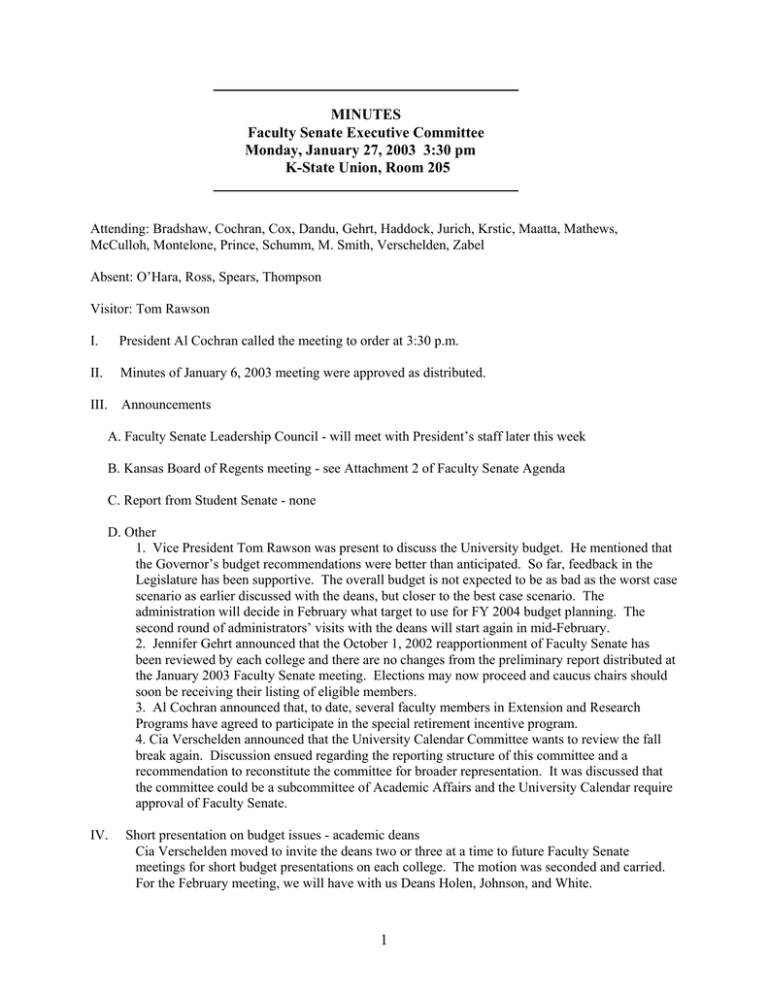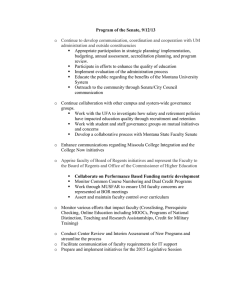MINUTES Faculty Senate Executive Committee Monday, January 27, 2003 3:30 pm
advertisement

MINUTES Faculty Senate Executive Committee Monday, January 27, 2003 3:30 pm K-State Union, Room 205 Attending: Bradshaw, Cochran, Cox, Dandu, Gehrt, Haddock, Jurich, Krstic, Maatta, Mathews, McCulloh, Montelone, Prince, Schumm, M. Smith, Verschelden, Zabel Absent: O’Hara, Ross, Spears, Thompson Visitor: Tom Rawson I. President Al Cochran called the meeting to order at 3:30 p.m. II. Minutes of January 6, 2003 meeting were approved as distributed. III. Announcements A. Faculty Senate Leadership Council - will meet with President’s staff later this week B. Kansas Board of Regents meeting - see Attachment 2 of Faculty Senate Agenda C. Report from Student Senate - none D. Other 1. Vice President Tom Rawson was present to discuss the University budget. He mentioned that the Governor’s budget recommendations were better than anticipated. So far, feedback in the Legislature has been supportive. The overall budget is not expected to be as bad as the worst case scenario as earlier discussed with the deans, but closer to the best case scenario. The administration will decide in February what target to use for FY 2004 budget planning. The second round of administrators’ visits with the deans will start again in mid-February. 2. Jennifer Gehrt announced that the October 1, 2002 reapportionment of Faculty Senate has been reviewed by each college and there are no changes from the preliminary report distributed at the January 2003 Faculty Senate meeting. Elections may now proceed and caucus chairs should soon be receiving their listing of eligible members. 3. Al Cochran announced that, to date, several faculty members in Extension and Research Programs have agreed to participate in the special retirement incentive program. 4. Cia Verschelden announced that the University Calendar Committee wants to review the fall break again. Discussion ensued regarding the reporting structure of this committee and a recommendation to reconstitute the committee for broader representation. It was discussed that the committee could be a subcommittee of Academic Affairs and the University Calendar require approval of Faculty Senate. IV. Short presentation on budget issues - academic deans Cia Verschelden moved to invite the deans two or three at a time to future Faculty Senate meetings for short budget presentations on each college. The motion was seconded and carried. For the February meeting, we will have with us Deans Holen, Johnson, and White. 1 V. Reports from Standing Committees A. Academic Affairs Committee - Jackie Spears 1. Cia Verschelden moved to place on the Faculty Senate agenda approval of addition to a graduation list: August 2002 Steven J. Lackey, Architecture, Planning, and Design, Bachelor of Architecture Motion carried. B. Faculty Affairs Committee - Eric Maatta No action items. The committee is starting to exam the interim policy on mediation. C. Faculty Senate Committee on University Planning - Walter Schumm Senator Schumm plans to invite Dr. Rawson to their next meeting. D. Faculty Senate Committee on Technology - Beth Montelone FSCOT heard from Dr. Rosemary Talab, Coordinator of the Intellectual Property Information Center, about the new TEACH (Technology Education and Copyright Harmonization) Act and its impacts on and significance to online and distance education. See their January 21, 2003 minutes at http://www.ksu.edu/facsen/fscot/cotm0103.htm. VI. Old Business - none VII. New Business The committee utilized a random sample to identify names from each college for potential committee members for an Appendix M hearing—notice of non-reappointment of a tenured faculty member. VIII. For the Good of the University –Ruth Dyer asked that mention be made of the next Provost lecture by Kenneth Klabunde, KSU University Distinguished Professor. It will occur on Monday, February 24th, in the Hale Library Hemisphere room at 3:30 p.m. IX. Adjournment - Meeting adjourned at 5:15 p.m. 2 Attachment 2 Board of Regents Meeting Report January 2003 1. The BOR had extended discussion relative to what should be their legislative agenda and how it should be put forward, this in response to queries made by Daron Jamison, chair of the Students’ Advisory Committee. Students want their voices to be heard regarding upcoming deliberations about tuition increases. 2. Dick Carter, BOR legislative liaison, indicated that the office is working on a budget template to facilitate interaction with the legislature. He expressed concern regarding possible unfunded mandates that could be passed on to the board, such as tuition benefits for the families of deceased state workers, for example. Regent Bond stated that we need to have a coordinated effort, focused around the theme, “Thank you for stopping the blood flow, but higher education is still on life support!” 3. The Council of Business Officers’ white paper was submitted to the governor’s efficiency team, but it is uncertain how it will be received. If COBO’s recommendations are accepted, it could save higher education institutions a great deal of money through not having to use state-authorized suppliers of products. 4. KSU’s new degree request for a Master of Public Health was approved by the BOR. 5. The Council of Faculty Senate Presidents discussed possible tuition hikes for next year and the processes and procedures on each campus that are used to make these decisions. In comments to the BOR, the COFSP chair stated that the council feels that these decisions should include significant input from faculty and students. 6. The BOR accepted and passed the COFSP proposal for Regents’ Faculty of the Year Awards. 7. Discussion occurred regarding the Performance Agreements initiative, including a report from the task force established to investigate this topic. 8. Discussion occurred regarding the Southwest Kansas Access Group. In this time of limited financial capability on the part of the state of Kansas, it was decided that a single site will not be adopted, but rather something involving multiple sites and providers. 9. The governor’s address received a positive response from BOR members and the representatives from the governed institutions. 3

